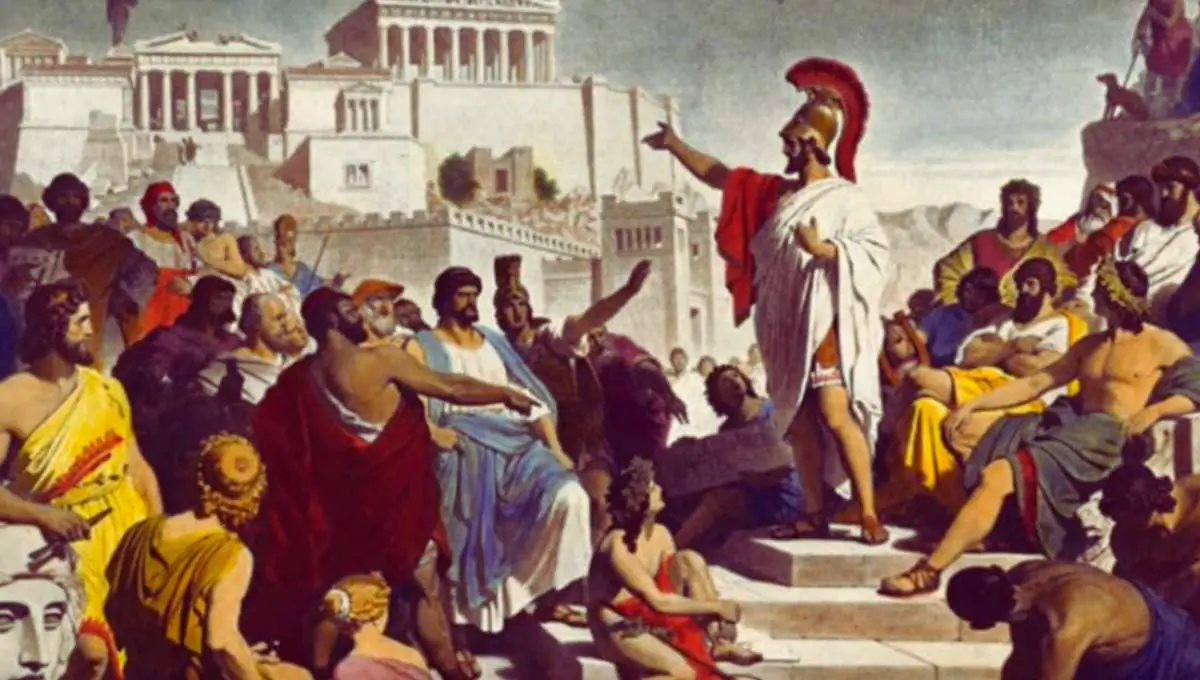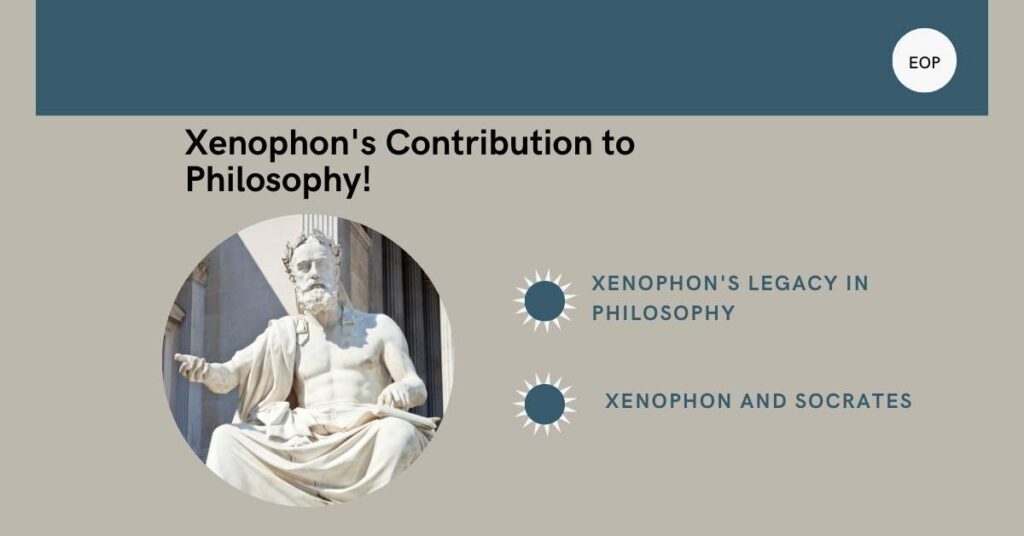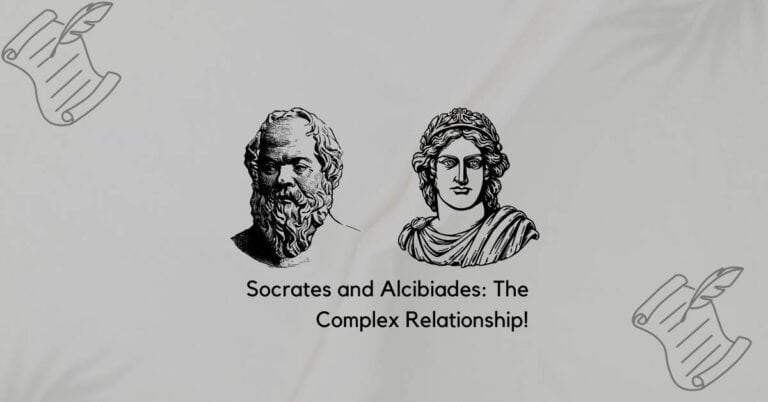Xenophon’s Contribution to Philosophy: Socrates’ Famous Student!
Imagine you’re hanging out with the most incredible teacher ever – someone who asks amazing questions challenges your thinking and makes you laugh while you learn.
That was Socrates for the ancient Greeks. But what about Xenophon? Well, Xenophon was Socrates’ right-hand man.
Xenophon had other things on his resume – soldier, historian, you name it. However, Xenophon’s contribution to philosophy lies in preserving and interpreting the teachings of Socrates.
Now, Socrates himself never wrote anything down. He was all about lively discussions, which is awesome but kind of a pain point for historians.
That’s where Xenophon comes in. He captured Socrates’ ideas in books like “Memorabilia,” which is kind of like a collection of Socrates’ greatest hits.
This blog will cover Xenophon’s contribution to philosophy and preserving Socrates’ thoughts.
Who is Xenophon? A Brief Biography
Xenophon (circa 430-354 BCE) was an ancient Greek historian, philosopher, soldier, and student of Socrates. Born in Athens, Xenophon came from a wealthy family and received a traditional education in rhetoric and philosophy. He is known for his diverse contributions to literature and his firsthand accounts of historical events, which provide valuable insights into the social, political, and military life of ancient Greece.
Early Life and Education
Xenophon was born around 430 BCE in the deme of Erchia, near Athens. He belonged to the upper class and had access to education and opportunities that were rare for his time. His early education included studying under Socrates, one of the most influential philosophers in history. Xenophon’s writings often reflect Socratic ideas, and he is considered one of the primary sources of information about Socrates’ life and teachings.
Military Career
Xenophon’s military career began when he joined the expedition of Cyrus the Younger, a Persian prince, in 401 BCE. This campaign, known as the March of the Ten Thousand, aimed to seize the Persian throne. Although the mission ultimately failed, Xenophon played a crucial role in leading the Greek mercenaries back to safety after Cyrus’ death. His account of this journey, “Anabasis” (The Expedition or The March Up Country), is one of his most famous works and provides a detailed narrative of the challenges and adventures faced by the soldiers.
Writings and Contributions
Xenophon’s literary contributions are vast and varied, encompassing history, philosophy, and practical treatises. Some of his notable works include:
- “Anabasis”: A detailed account of the March of the Ten Thousand.
- “Hellenica”: A continuation of Thucydides’ “History of the Peloponnesian War,” covering the final years of the conflict and its aftermath.
- “Cyropaedia”: A partly fictionalized biography of Cyrus the Great, exploring themes of leadership and governance.
- “Memorabilia”: A collection of dialogues and anecdotes preserving Socratic philosophy and teachings.
- “Oeconomicus”: A Socratic dialogue focused on household management and agriculture.
- “Symposium”: A depiction of a banquet conversation exploring various topics, including love and friendship.
Exile and Later Life
Due to his association with Sparta and his participation in military campaigns against Athens, Xenophon was exiled from his home city. He spent much of his later life in Sparta and on an estate near Olympia, where he continued to write and reflect on his experiences. His works reveal his admiration for both Athenian and Spartan cultures, as well as his pragmatic approach to life and governance.
Xenophon died around 354 BCE, leaving behind a legacy as a historian, philosopher, and soldier. His writings offer a unique perspective on the classical world and continue to be studied for their historical and philosophical insights.
Why is Xenophon important?
Xenophon’s role in philosophy extends far beyond merely documenting Socrates’ teachings. His contributions provide a deeper understanding of ancient philosophy and its practical applications. Here’s an in-depth look at why Xenophon’s work is essential:
Complementary Perspective on Socrates:
Xenophon, alongside Plato, offers a dual perspective on Socrates, enriching our comprehension of the philosopher. While Plato’s dialogues are known for their philosophical depth and theoretical exploration, Xenophon’s writings, including “Memorabilia” and “Symposium,” present a more practical view of Socratic philosophy. Plato often explores abstract concepts through complex dialogues, whereas Xenophon focuses on Socrates’ everyday interactions and practical advice. This complementary approach allows us to see how Socrates’ ideas were applied in daily life, offering a more holistic understanding of his philosophy.
Xenophon’s practical perspective is particularly evident in his depiction of Socrates as a mentor who provides actionable advice on ethics, politics, and personal conduct. For instance, in “Memorabilia,” Xenophon highlights Socrates’ emphasis on virtue and self-discipline through real-life anecdotes and conversations, offering practical insights into how these virtues can be cultivated and applied.
Active Engagement with Socratic Ideas:
Xenophon’s engagement with Socratic ideas goes beyond documentation; he actively interprets and applies them in his own works. In “Cyropaedia,” Xenophon outlines his vision of ideal leadership and governance, drawing on Socratic principles of virtue and wisdom. This work, often considered a historical and philosophical treatise, demonstrates how Socratic ideas about leadership and morality can be integrated into practical political theory.
Moreover, Xenophon’s “Oeconomicus” explores the role of household management and economic ethics, reflecting Socratic values of self-control and piety in practical contexts. Through these writings, Xenophon illustrates how Socratic principles can be applied to various aspects of life, from personal development to governance.
Influence on Later Philosophical Traditions:
Xenophon’s practical approach to philosophy had a significant impact on subsequent intellectual traditions, particularly Stoicism. Stoic philosophers such as Epictetus and Marcus Aurelius were influenced by Xenophon’s emphasis on self-discipline, reason, and virtuous living. The Stoics adopted and adapted Xenophon’s ideas, integrating them into their own ethical frameworks.
Understanding Xenophon’s impact on Stoicism provides valuable insights into the continuity and evolution of ethical thought from ancient Greece to later philosophical movements. His contributions help bridge the gap between Socratic philosophy and Stoic ethics, highlighting the enduring relevance of his ideas.
Bridging Ancient and Modern Thought:
Xenophon’s focus on practical applications of philosophical concepts makes his work particularly relevant for understanding how ancient philosophy can address modern issues. His writings explore how philosophical ideas can be applied to everyday challenges, making them accessible and relatable. For example, his discussions on leadership, ethics, and personal conduct offer timeless advice that remains applicable in contemporary contexts.
By presenting philosophy in a practical and actionable manner, Xenophon helps readers connect ancient wisdom with current experiences. This approach not only enhances our understanding of Socratic thought but also demonstrates its enduring significance in addressing modern ethical and practical concerns.
Key Philosophical Ideas in Xenophon’s Works: Practical Applications

While specific, documented anecdotes about Xenophon applying philosophy in everyday life are harder to come by (due to the nature of historical records), we can glean some insights from his writings:
1. The Grumpy General:
Imagine this: Xenophon is on a military campaign, leading a frustrated and demoralized army. Food is scarce, morale is low, and grumbling soldiers are ready to mutiny.
Here’s where Xenophon’s philosophy of leadership kicks in. He wouldn’t just bark orders. He’d likely draw on Socratic methods, engaging in dialogues with the soldiers. He might ask questions like:
- “What qualities make a good leader?”
- “How can we overcome these challenges together?”
- “What actions demonstrate true courage in the face of hardship?”
By sparking these discussions, Xenophon could use reason and shared values to motivate the troops, reminding them of their purpose and the importance of perseverance.
2. The Art of the Deal (the Philosophical Way):
Xenophon, as a soldier and strategist, likely encountered his fair share of negotiations. Here, his emphasis on self-control and clear communication would be crucial. He wouldn’t make impulsive threats or emotional pleas. Instead, he might focus on:
- Understanding the other side’s perspective: By employing Socratic questioning, he could try to understand the needs and concerns of his negotiating partner.
- Reasoned arguments: He would present his position with logic and evidence, appealing to the other party’s sense of fairness and self-interest.
- Maintaining composure: He wouldn’t let emotions cloud his judgment or give away his bargaining position.
By utilizing these philosophical tools, Xenophon could strive for mutually beneficial agreements.
3. Xenophon’s Philosophical Toolbox: Self-Control, Piety, and Friendship
Xenophon, unlike some philosophers who dwelled in abstract ideas, focused on practical applications of philosophy for everyday life. Here, you can read three key concepts he explored in his writings:
Self-Control ( σωφροσύνη – sōphrosynē):
This wasn’t just about willpower. For Xenophon, it was a multifaceted concept. It involved mastering your desires, acting with reason rather than impulse, and remaining calm in challenging situations.
Think of a soldier on a battlefield – self-control would mean maintaining composure under enemy fire, making strategic decisions, and not succumbing to fear or anger.
Piety (εὐσέβεια – eusébeia):
This wasn’t just blind faith. Xenophon believed in respect for the divine order and the importance of following moral principles because they were pleasing to the gods.
Piety also involved gratitude and acting following what the gods deemed just. For a leader, piety meant ruling with a sense of responsibility and fairness, acknowledging a higher power.
Friendship (φιλία – philia):
Xenophon saw friendship as a cornerstone of a good life. It wasn’t just about having friends to hang out with.
True friendship, for him, involved loyalty, mutual respect, and shared values. Friends held each other accountable, offered support in difficult times, and helped each other live virtuously.
Think about a group of soldiers – their strong friendships on the battlefield could mean the difference between life and death, as they relied on each other for courage and cooperation.
By exploring these concepts, Xenophon aimed to equip individuals with the philosophical tools to navigate the complexities of daily life, from leading troops to managing personal challenges.
The Ideal Ruler:
Xenophon’s “Cyropaedia”: The Making of a Super-Ruler (Maybe a Little Too Super)
So far, we’ve explored how Xenophon emphasized practical philosophy in everyday life. But his writings go beyond self-help manuals for ancient Greeks.
One of his most fascinating works is the “Cyropaedia,” which literally translates to “The Education of Cyrus.”
Here’s the twist: This isn’t a dry historical biography. It’s a fictionalized account of Cyrus the Great, founder of the mighty Persian Empire.
Xenophon paints Cyrus not just as a powerful ruler but as the ultimate embodiment of his ideal leader.
Now, some scholars debate how historically accurate the portrayal is (let’s just say Cyrus might have been a tad more ruthless in real life). However, the key takeaway is that Xenophon uses this fictionalized narrative to showcase the qualities he believes make a truly great leader. These qualities likely reflect his observations of successful leaders in his time.
So, what kind of ruler does Xenophon idolize in “Cyropaedia”? We’ll delve into that in the next section but get ready for a leader who’s a master strategist, a motivational speaker extraordinaire, and maybe even a touch manipulative (but hey, all for the good of the empire, right?).
“Cyropaedia”: Building the Ideal Ruler Brick by Philosophical Brick
In “Cyropaedia,” Xenophon doesn’t just tell the story of Cyrus the Great; he uses it as a kind of philosophical blueprint for crafting the ideal ruler. Here’s how he outlines these characteristics:
- The Philosopher-King:
Xenophon’s ideal leader is as comfortable with philosophical concepts as they are with military strategy.
Cyrus, in the book, is depicted as a master of self-control, employing reason and logic to make decisions. He also possesses piety, leading with a sense of responsibility towards the divine and his people.
- The Motivational Mastermind:
A good leader can’t just bark orders. They need to inspire loyalty and dedication. Xenophon highlights Cyrus’ ability to motivate his troops through inspiring speeches and leading by example.
He emphasizes the importance of building strong relationships with his soldiers, fostering a sense of camaraderie and shared purpose.
- The Strategist Supreme:
Of course, a ruler needs strategic prowess. Xenophon showcases Cyrus’s tactical genius, his ability to plan campaigns, and his skill in adapting to changing situations.
However, this isn’t just about brute force – Cyrus also uses his intellect to outmaneuver his opponents and secure victories with minimal bloodshed.
- The Just Ruler:
A tyrant doesn’t make Xenophon’s cut. Cyrus, in the book, embodies justice and fairness. He rules with a sense of responsibility for his people’s well-being and enforces laws with impartiality. This focus on justice ensures social cohesion and loyalty from subjects.
Now, it’s important to remember that Xenophon’s portrayal of Cyrus might be a bit idealized. Some historians argue he downplays Cyrus’s ruthlessness in his quest for power. However, by examining “Cyropaedia,” we gain valuable insights into the qualities Xenophon believed were essential for a truly great leader – qualities that continue to resonate in discussions of leadership today.
Xenophon’s Legacy in Philosophy
The Ripple Effect: How Xenophon Influenced Later Philosophers, Especially the Stoics
Xenophon’s contribution to philosophy wasn’t a one-off performance. His ideas rippled outwards, influencing later thinkers, particularly the Stoics. Here’s how:
- The Power of Practical Philosophy:
The Stoics, like Zeno of Citium, shared Xenophon’s emphasis on applying philosophical concepts to daily life.
They both believed that philosophy shouldn’t be an abstract pursuit but a guide for living virtuously.
Xenophon’s writings likely provided a foundation for the Stoics’ focus on reason, self-control, and living by nature.
- The Value of Virtue Ethics:
Both Xenophon and the Stoics placed a high value on cultivating virtues like courage, justice, and temperance.
Xenophon’s exploration of these concepts in works like “Cyropaedia” likely resonated with the Stoics, who developed their own elaborate system of ethics centered around living a virtuous life.
- The Art of Self-Mastery:
Both Xenophon and the Stoics believed in the importance of self-control. Xenophon stressed the need to master desires and act with reason.
The Stoics built upon this, emphasizing the idea of emotional control and remaining calm in the face of adversity.
While Xenophon might not be a household name compared to some philosophers, his influence on the Stoics is undeniable. His focus on practical philosophy, virtue ethics, and self-mastery helped shape this influential school of thought.
And through the Stoics, Xenophon’s ideas continued to influence philosophical and ethical discourse for centuries to come.
The debate regarding Xenophon’s Contribution to Philosophy:
While Xenophon’s influence on later thinkers is clear, there’s some debate about his own philosophical originality.
Some scholars see him primarily as a transmitter of Socrates’ ideas, questioning whether he developed his own distinct philosophical system.
Critics:
Critics point out that Xenophon’s writings lack the rigorous logic and theoretical depth found in the works of other significant philosophers. They argue he focuses more on practical applications than complex philosophical arguments.
Supporters:
However, defenders of Xenophon highlight the value of his practical approach. They argue that by making philosophy accessible and relevant to everyday life, he played a crucial role in its development.
Ultimately, the debate continues. But regardless of his originality, Xenophon’s contribution to philosophy is undeniable. He preserved Socrates’ ideas, influenced later schools of thought, and offered a unique perspective on leadership, virtue, and the pursuit of a good life.
Xenophon and Socrates:
Portrayals of Socrates by Xenophon and Plato:
While both Xenophon and Plato were students of Socrates, their depictions of the enigmatic philosopher offer surprisingly contrasting perspectives. Let’s delve into the key differences:
- Focus:
Xenophon: Xenophon emphasizes the practical aspects of Socrates’ teachings. He showcases how Socrates’ questioning methods and emphasis on reason could be applied to everyday life, leadership, and ethical dilemmas. His “Memorabilia” reads like a collection of practical wisdom gleaned from Socrates.
Plato: Plato is more concerned with the theoretical underpinnings of Socrates’ ideas. He explores complex questions about knowledge, virtue, and the nature of reality through dialogues featuring Socrates as the main interlocutor. His dialogues, such as “The Republic,” are more philosophical treatizes than practical guides.
- Personality:
Xenophon: Xenophon portrays Socrates as a more down-to-earth figure, a wise friend offering guidance on navigating life’s challenges. He highlights Socrates’ piety, self-control, and ability to connect with people from all walks of life.
Plato: Plato’s Socrates is more of an intellectual gadfly, relentlessly questioning assumptions and provoking deep thought. He can be seen as arrogant and dismissive, constantly challenging others and never offering definitive answers.
- Method:
Xenophon: Xenophon presents Socrates as employing a more direct questioning style, eliciting specific answers and offering practical advice.
Plato: Plato’s Socrates utilizes the “Socratic Method,” employing a series of probing questions to guide the interlocutor toward self-discovery and critical thinking. He often avoids providing answers directly.
- Importance:
These contrasting portrayals offer a richer understanding of Socrates. Xenophon provides a grounded perspective on the man and his practical wisdom. Plato delves deeper into the philosophical implications of his ideas.
Ultimately, both students played crucial roles in preserving and interpreting the legacy of this pivotal figure in Western philosophy.
A Glimpse into Socrates’ World: Why “Memorabilia” Matters
Imagine having a close friend who was also a brilliant philosopher. Now, imagine that a friend wrote a book capturing your mentor’s teachings and personality. That’s precisely what Xenophon’s “Memorabilia” offers – a unique window into the daily life and teachings of Socrates.
Here’s why “Memorabilia” provides a fresh perspective on Socrates:
- Beyond the Classroom:
Plato’s famous dialogues often depict Socrates in philosophical debates or formal settings. “Memorabilia” goes beyond that.
It offers anecdotes and insights into Socrates’ everyday life – how he interacted with friends, family, and ordinary Athenians. We see Socrates not just as a philosopher but as a relatable human being.
- Focus on Practical Application:
Unlike Plato’s more theoretical approach, Xenophon emphasizes the practical applications of Socrates’ teachings.
He showcases how Socrates’ emphasis on reason, self-control, and critical thinking could be used to navigate everyday challenges, from managing finances to leading a household. “Memorabilia” feels like a practical guide to living a good life based on Socratic principles.
- A Different Socrates:
While there’s some overlap with Plato’s portrayal, Xenophon’s Socrates comes across as more down-to-earth and approachable.
He highlights Socrates’ righteousness, self-control, and ability to connect with people from all walks of life. This portrayal complements Plato’s focus on Socrates as a relentless intellectual gadfly.
- Socrates’ Own Words (Maybe):
While the historical accuracy is debated, Xenophon claims to have directly recorded many of Socrates’ conversations.
This offers a potentially firsthand account of Socrates’ thoughts and methods, providing valuable insights not found elsewhere.
By offering a glimpse into Socrates’ daily life and practical teachings, “Memorabilia” complements Plato’s more theoretical approach.
It allows us to see Socrates not just as a towering intellectual figure, but as a wise friend and a guide for living a virtuous life.
How did Xenophon defend Socrates?
Unlike Plato, who wrote famous dialogues featuring Socrates defending himself, Xenophon’s defense of Socrates is more subtle and spread throughout his writings. Here’s how Xenophon likely defended his teacher:
- Highlighting Socrates’ Character:
Xenophon portrays Socrates as a pious, just, and self-controlled individual. This portrayal aims to counter accusations of impiety and corrupting the youth.
- Emphasizing Socrates’ Teachings:
By showcasing Socrates’ focus on reason, virtue, and self-knowledge, Xenophon suggests his teachings were beneficial, not harmful, to Athenian society.
- Indirect Defense Through “Memorabilia”:
This work showcases Socrates’ everyday life and interactions, implicitly arguing that such a man couldn’t be a danger to the state.
- Focus on Practical Applications:
By demonstrating how Socratic ideas could be used for exemplary leadership and ethical living, Xenophon counters accusations that Socrates’ teachings were subversive.
While Xenophon doesn’t have a single, dedicated defense speech like Plato’s “Apology,” his writings as a whole paint a positive picture of Socrates, implicitly defending him against the charges that led to Socrates’ execution.
What are some interesting facts about Xenophon?
Here are some interesting facts about Xenophon:
- From Wealthy Equestrian to Mercenary:
Born into Athenian aristocracy, Xenophon’s life took an unexpected turn. He joined a band of Greek mercenaries fighting for the Persian prince Cyrus the Younger, a decision that would shape his writings and experiences.
- An Exile with a Cause:
After his mercenary days, Xenophon faced exile from Athens, possibly due to his association with Sparta. This experience might have influenced his ideas about leadership and the ideal ruler explored in “Cyropaedia.”
- A Versatile Author:
Xenophon wasn’t just a philosopher. He wrote extensively on topics like horsemanship (“On Horsemanship”), hunting (“Cynegeticus”), and even household management (“Oeconomicus”). This range of interests reflects his practical approach to knowledge.
- A General Who Documented War:
Xenophon’s “Anabasis” is a unique historical account, chronicling a grueling military expedition he led after the death of Cyrus the Younger. It offers a firsthand perspective on the realities of ancient warfare.
- A Dog Enthusiast:
Unlike most philosophers, Xenophon dedicated an entire treatise, “Cynegeticus,” to the art of hunting with dogs. This highlights his appreciation for the natural world and the bond between humans and animals.
These exciting facts showcase Xenophon as a multifaceted philosopher, soldier, historian, and even an early dog lover. They offer a glimpse into the experiences that shaped his thinking and the lasting impact of his work.
Conclusion
In conclusion, Xenophon’s contribution to philosophy stretches beyond simply being Socrates’ student. He acted as a bridge, preserving Socratic wisdom for future generations.
But Xenophon’s significance goes beyond mere documentation. He championed the practical application of philosophy to everyday life, offering a unique and valuable perspective on Socrates himself.
His emphasis on reason, self-control, and virtue ethics influenced later schools of thought and continues to resonate today.
By studying Xenophon’s works, we gain a richer understanding of the birth of Western philosophy, practical tools for navigating life’s complexities, and a reminder that philosophy can be both profound and practical.
So, while Xenophon may not be a household name, his contribution to philosophy is undeniable. He stands as a testament to the enduring power of ideas, reminding us that even a “wingman” can leave a lasting mark on the intellectual landscape.



